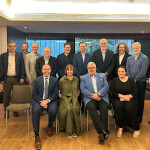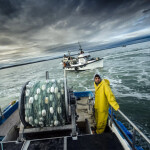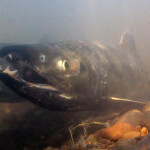Citing the Gulf oil spill, Sen. David Vitter (R-La.) on May 25 introduced legislation aimed at halting any federal attempts to set up a regulatory framework to permit offshore fish farms in U.S. waters. The bill -- the Research in Aquaculture Opportunity and Responsibility Act of 2010 -- could throw a wrench in NOAA's plans to set up a national offshore aquaculture policy.
Vitter claims the Gulf and its marine ecosystem, as well as its recreational and commercial fisheries, are under too much pressure because of the oil spill to be subjected to the potential additional stresses of fish farms. (Here's his press release.)
The irony, however, is that Vitter opposes President Obama's moratorium on offshore oil drilling in the Gulf. Apparently, the aquaculture industry puts more stress on the marine environment than the oil industry. As noted recently over at SeafoodSource.com, fish farms don't explode.
Vitter's bill would do the following:
- Prohibit any federal agency or Regional Fishery Management Council from developing or approving of "any rule, regulation, fishery management plan, or fishery management plan amendment to permit or regulate offshore aquaculture" for three and a half years.
- Provide grants for research related to land-based recirculating aquaculture systems.
- Require the U.S. Secretary of Commerce to prepare a report on the environmental and economic impacts of open ocean aquaculture on native fish species, recreational and commercial fisheries, coastal communities, and land-based recirculating aquaculture systems.
- And, finally, require a report be written on the economic potential of land-based aquaculture systems.
I'm sensing Sen. Vitter is partial to land-based aquaculture systems. What do you think?
Food & Water Watch, the ubiquitous opponent of all things mariculture, quickly threw its support behind Vitter's bill. "Given the current challenges facing the Gulf, it is important that we avoid introducing any additional factors that could jeopardize the region's socio-economic or environmental health," said Wenonah Hauter, executive director of Food & Water Watch.
Posted to The New Aquaculture
Comments:
Christina Lizzi, Policy Anaylst, Food & Water Watch:
Sen. Vitters bill - the Research in Aquaculture Opportunity and Responsibility Act of 2010 (S.3417) is welcomed by Food & Water Watch for a number of reasons. But Food & Water Watch is not the only organization to endorse the bill early on. A number of groups have done so publicly as well, including Louisiana Shrimp Association, Louisiana United Commercial Fisherman's Association, Louisiana Charterboat Association, Florida Keys Fishing Guides Association, Mangrove Action Project, Center for Food Safety, KAHEA:The Hawaiian Environmental Alliance and Maui Tomorrow.
Some important things to note about the bill are that, like Food & Water Watch, it is not against "all things mariculture." The bill exempts salmon hatcheries, live rock and culture of mollusks, with the exception of cephalopods from the moratorium. It supports investigation into the potential for land-based recirculating aquaculture systems which to date have not received the same amount of funding for research or developmental support from National Oceanic and Atmospheric Administration that offshore aquaculture has.
While the press around the bill has related it to the spill in the Gulf of Mexico this bill would protect all of our oceans and fishermen from the unforeseen consequences of rushing headlong into the development of offshore aquaculture without adequately exploring both the lessons learned from abroad and the opportunities for other aquaculture technologies to meet our seafood demands.
It is also troubling that some, in opposition to this bill, have gone so far as to make the comparison that "fish farms don't explode." Clearly, fish farms could be an additional stressor to the Gulf but it is inappropriate to liken the them to the gravity of the catastrophe currently unfolding. To do so misses the point entirely. There are still many unknowns about offshore aquaculture - and the evidence we have from other ares of the world has shown it to be problematic. Given the overstressed nature of our ocean resources, Sen. Vitter is wise in advocating for the exercise of the precautionary principle in spite of industry complaints.
Whit Richardson:
Thanks for your comment, Christina.
To clarify, I didn't claim the bill was against "all things mariculture." I saw the exemptions for hatcheries and some shellfish aquaculure. I did describe Food & Water Watch that way, however, based on the fact that your organization has opposed basically every attempt at setting up an open ocean fish farm in U.S. waters. I also know many other organizations support Sen. Vitter's bill. Thank you for pointing them all out.
In response to your comment about comparing fish farming and oil drilling: You say it is "troubling that some, in opposition to this bill, have gone so far as to make the comparison that 'fish farms don't explode.'" I don't see why that observation is so troubling. It's a fact, after all. You go on to say "it is inappropriate to liken [fish farms] to the gravity of the catastrophe currently unfolding" in the Gulf. In my initial post, I only compared the two industries in the context of Sen. Vitter's apparent contradiction of opposing fish farms in the Gulf but supporting oil exploration and drilling in the Gulf. I'm not opposed to offshore oil drilling, per se, I just find it insincere for a politician to invoke the potential stresses to the Gulf's "vital ecosystems" when opposing fish farming, but ignoring those same concerns when it comes to supporting an industry, which also clearly imposes stress to the same "vital ecosystems," that I'm sure contributes to his reelection campaign.





